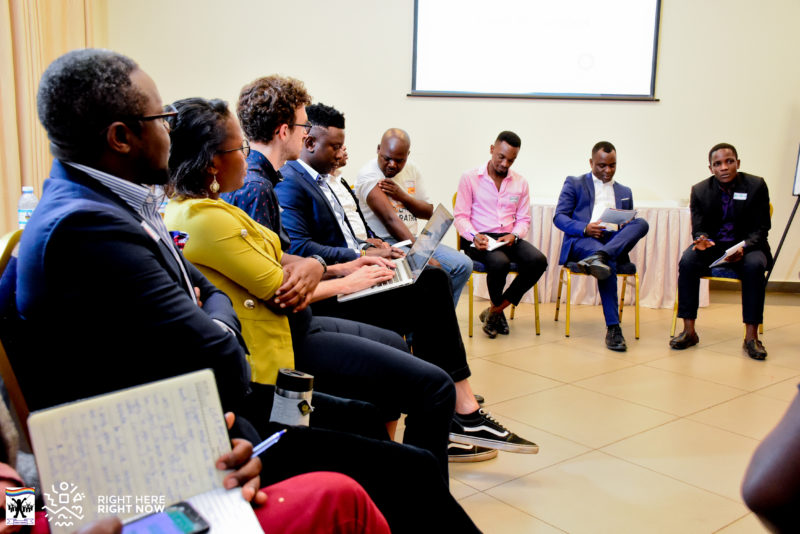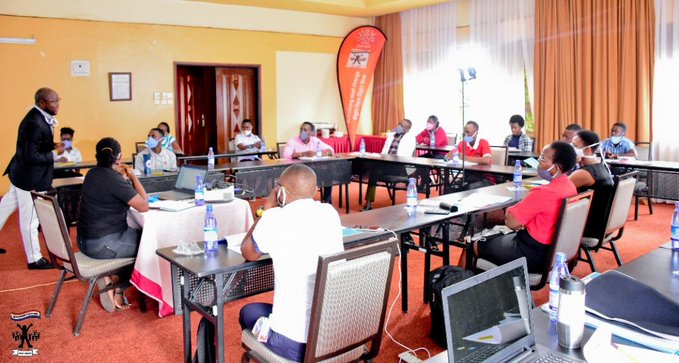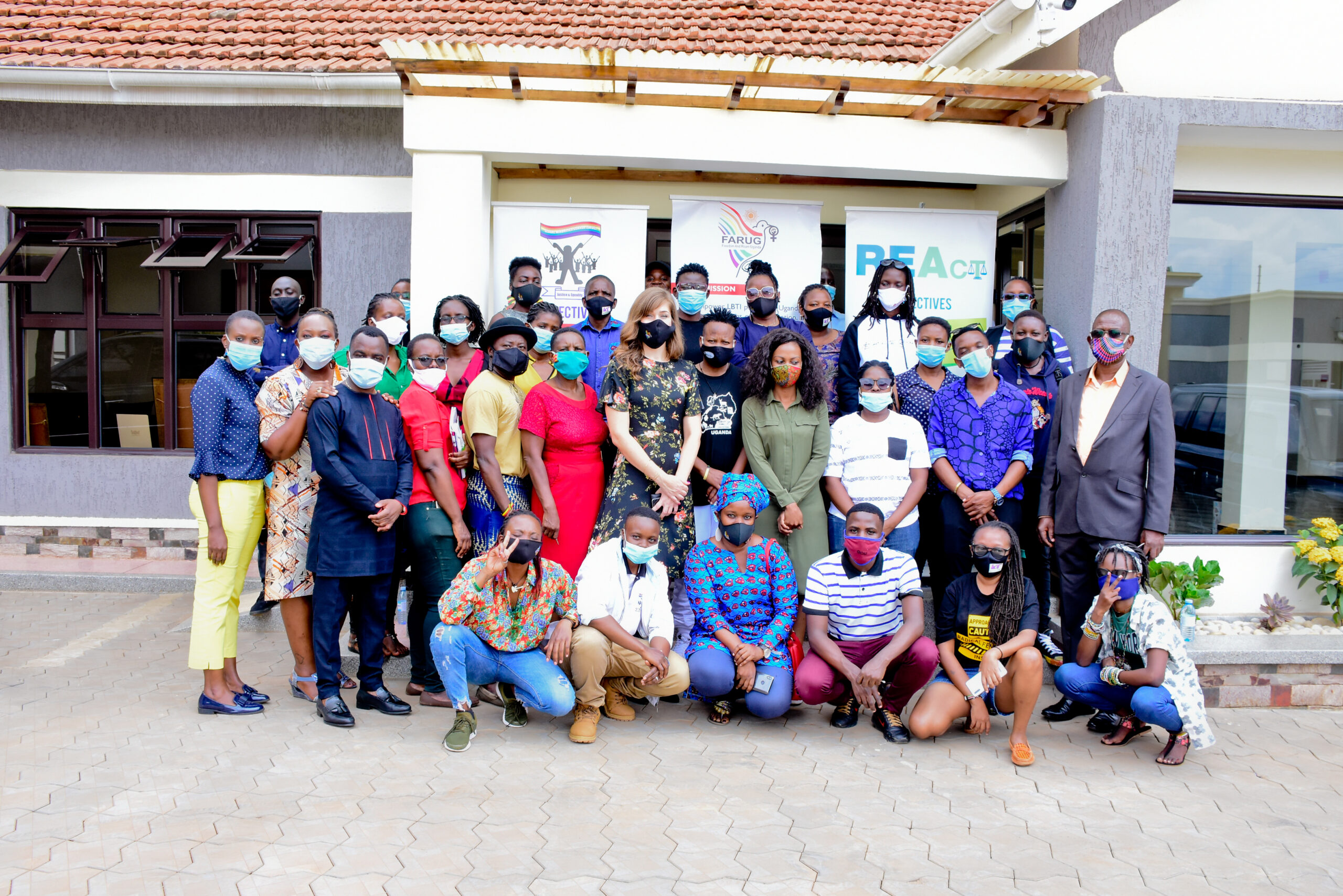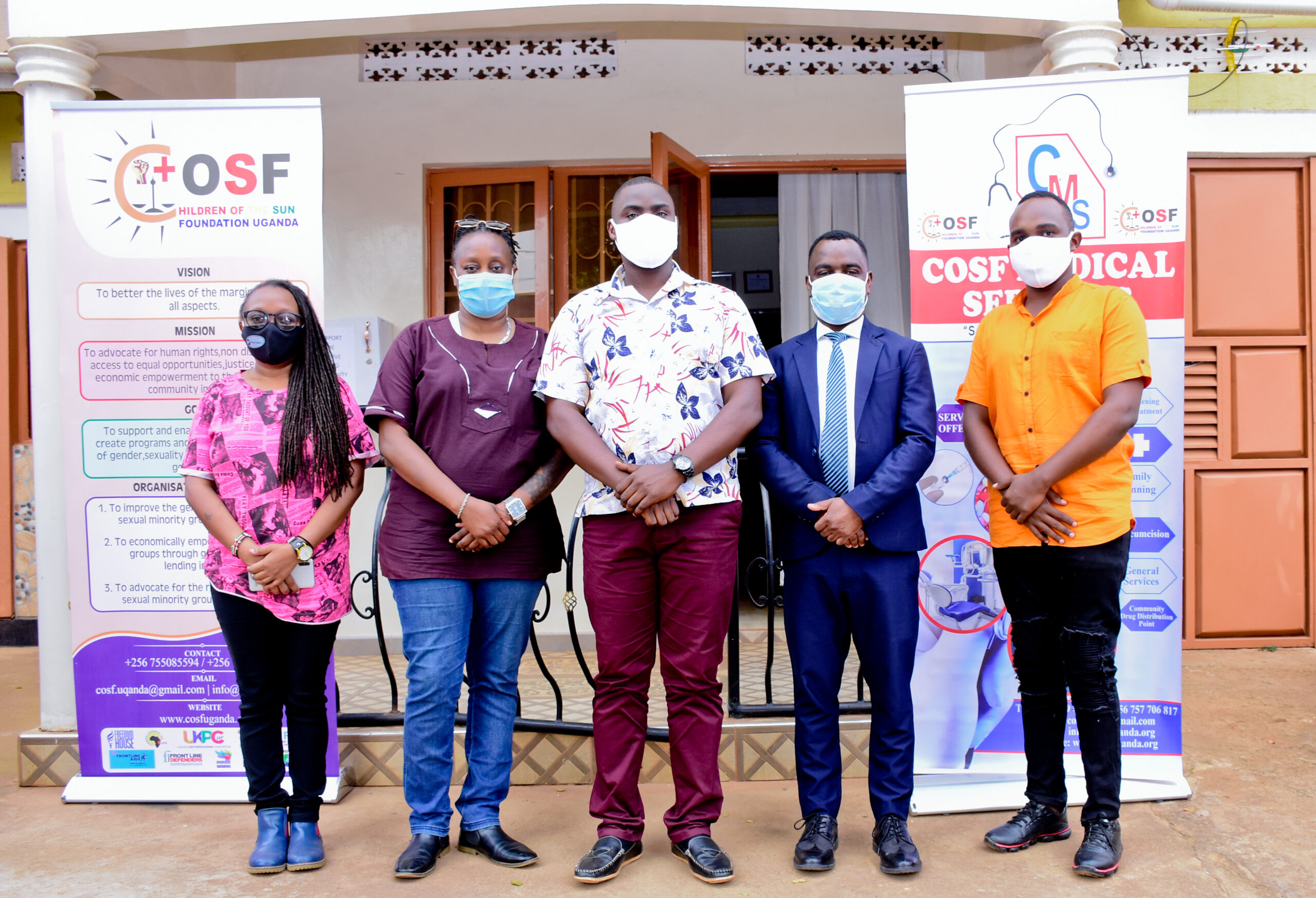Sexual Minorities Uganda Executive Director Dr Frank Mugisha Moderated a Panel Discussion as one of the ways to acclimatize Right Here Right Now platform members with the LGBTIQ acronyms and what they stand for. This session was held as part of a a dialogue was meant to inform platform members on the various issues of Sexual and Reproductive Health Rights (SRHR) that affect Lesbian Gay Bisexual Transgender Intersex and Queer persons in the country.
One of the questions from the participants was how they could distinguish a transgender person from a crowd and appropriately gender them.
Arthur Mubiru who is in charge of the drop in center at the Freedom and Roam Uganda said, transgender and intersex people change their gender during their course of growing. We are assigned gender at birth and we are not comfortable with these genders aligned to. I was born a female and now I’m a he because I’m a man, I’d love it if you respect my request than you stubbornly calling me a she just because you know I was once a she. Misgendering is addressing someone in a gender they formally had, people who are transphobic do this a lot. It is important to be attentive when in an LGBTIQ space especially when people are introducing themselves so that you do not misgender them, you can also pull someone to the side and ask them if you are not sure of how to address them. One of the safest ways to address someone if you are not certain of how to address them is to call them by name or to refer to them as “they”.
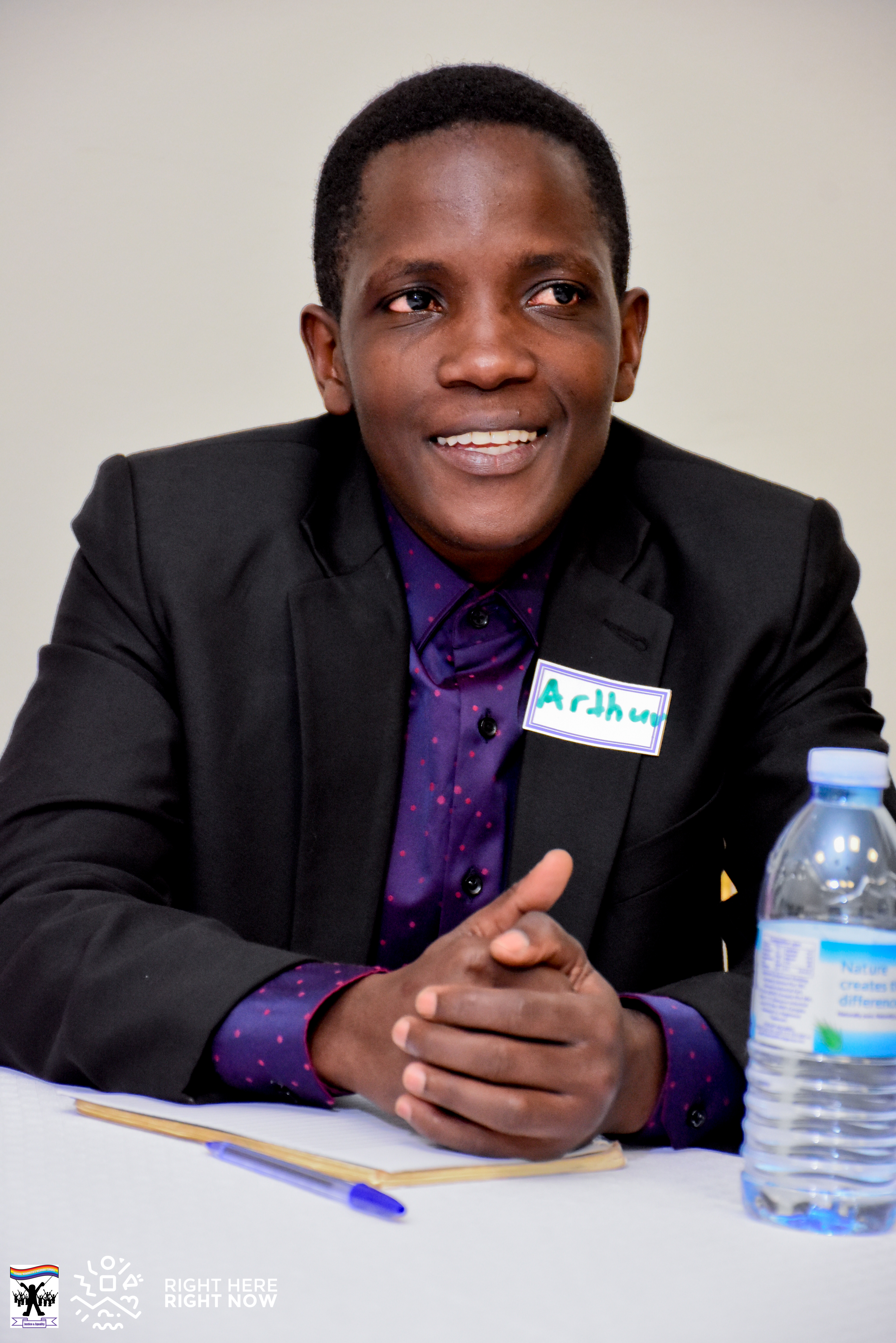
Another participant wanted to know how transgender people fill in forms that require them to disclose their biologically assigned gender. Arthur said “Lately there are forms with three boxes ie male, female and other, I always tick other. If a form has only two options ie male or female, I’ll tick male. I always tick on other especially when it comes to doctor’s appointments for my safety and so as not to surprise/shock the doctor.
When asked about the challenges he faces when travelling outside Uganda, Arthur said; “I’ve legally changed my name, I had to get a passport in my legal name that is Arthur Mubiru, good enough I was able to change my name before the national Identity Card project. I didn’t fill the gender part during the ID registration but the lady who registered me ticked Male, this is how I legally became male. What I know is transgender people need to have medical papers from at least three state sanctioned surgeons confirming that they have transitioned, this however does not mean it is not illegal for one to transition. I’ve been like this since I was young and most of the changes within me are all natural. People have always questioned who I am whether I am a girl or a boy, this gave me the strength to transition to my true gender. I prayed and hoped to change and become a girl but it wasn’t happening so I decided to live my life the way I am.”
A participant wondered what would happen if they had a child but were not told what gender the child is. Arthur said “Biologically assigned sex is the gender a midwife determines for a new born baby although when it comes to the intersex, they are affected after being born with congenital issues. Many people think an intersex person has both genitals but this is not true, there are so many different body differences they are born with. Some have small openings and grow beards in the future, sometimes the parents determine the gender of the child because of what they hoped to have.”
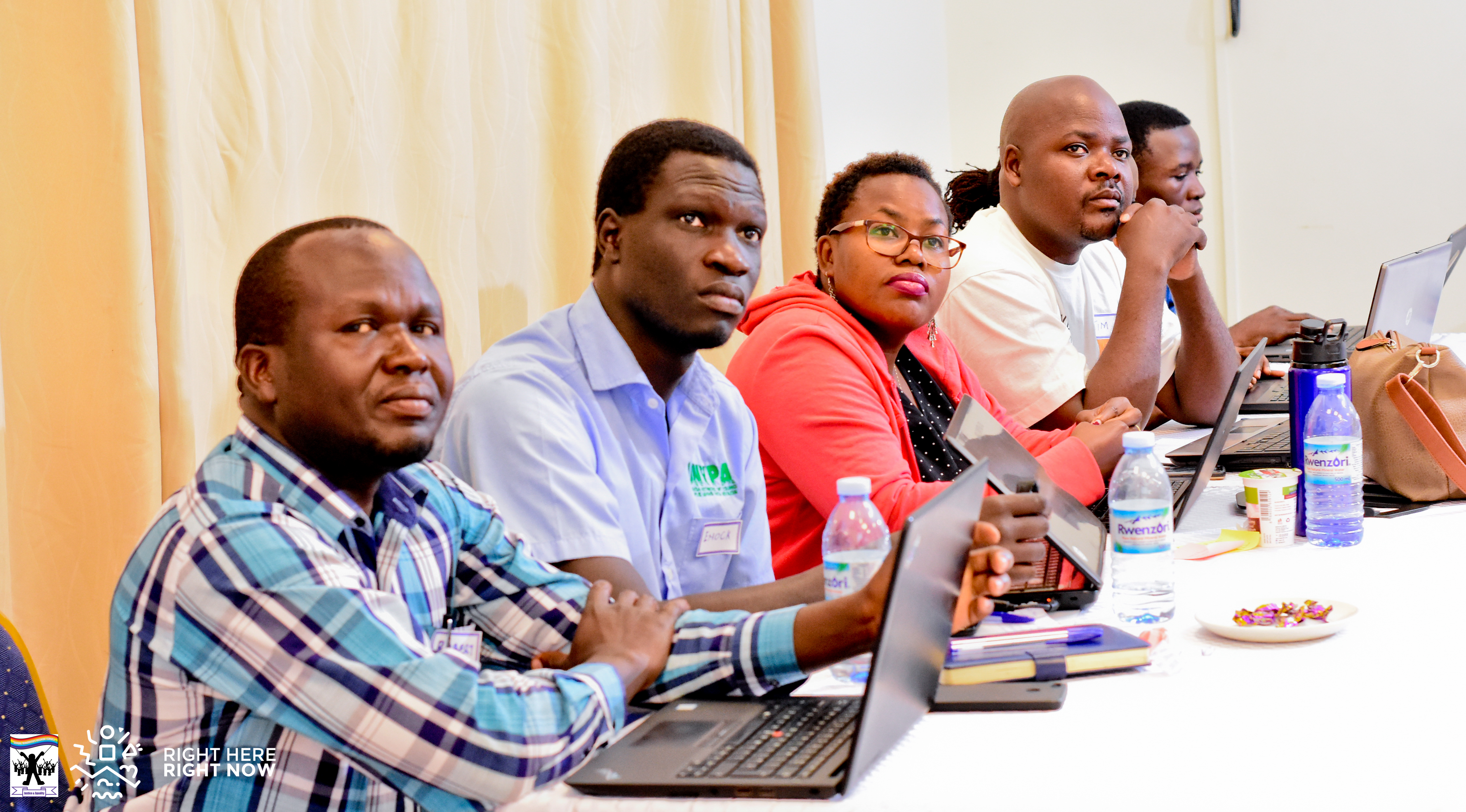
To this our Research and Documentation Officer Richard Lusimbo said,” We live in a binary system and a child cannot be in between or something else. They feel the need to slap a tag on kids this is why they say it is a girl or a boy. We are not given time to choose who we are, this is why when they grow up the change hence the issue of being different comes out.”
The Icebreakers Uganda Executive Director Luswata Brant was asked to explain the difference between “lesbian men” and gay men. He said, lesbians are women who are exclusively attracted to women while gay men are men exclusively attracted to men. There are two types of lesbians and gay men, we have femme lesbians who are women who could easily pass for heterosexual women, these have behavioral traits that are traditionally conceived as feminine while butch lesbians have behavioral traits could traditionally be conceived as manly. There are bottom gay men whose behavioral traits that are traditionally conceived as feminine and there are top gay men whose behavioral traits that are traditionally conceived as manly.” Brant added; Men that have sex with men-MSM is a compound term to mean gay people in Uganda, this was coined due to government conservatism, while doing advocacy for health rights, we use MSM to mean LGBTIQ people. (Men who have sex with men-MSM are men who are sexually attracted to men regardless of their sexual orientation, they could be gay, bisexual or otherwise.)
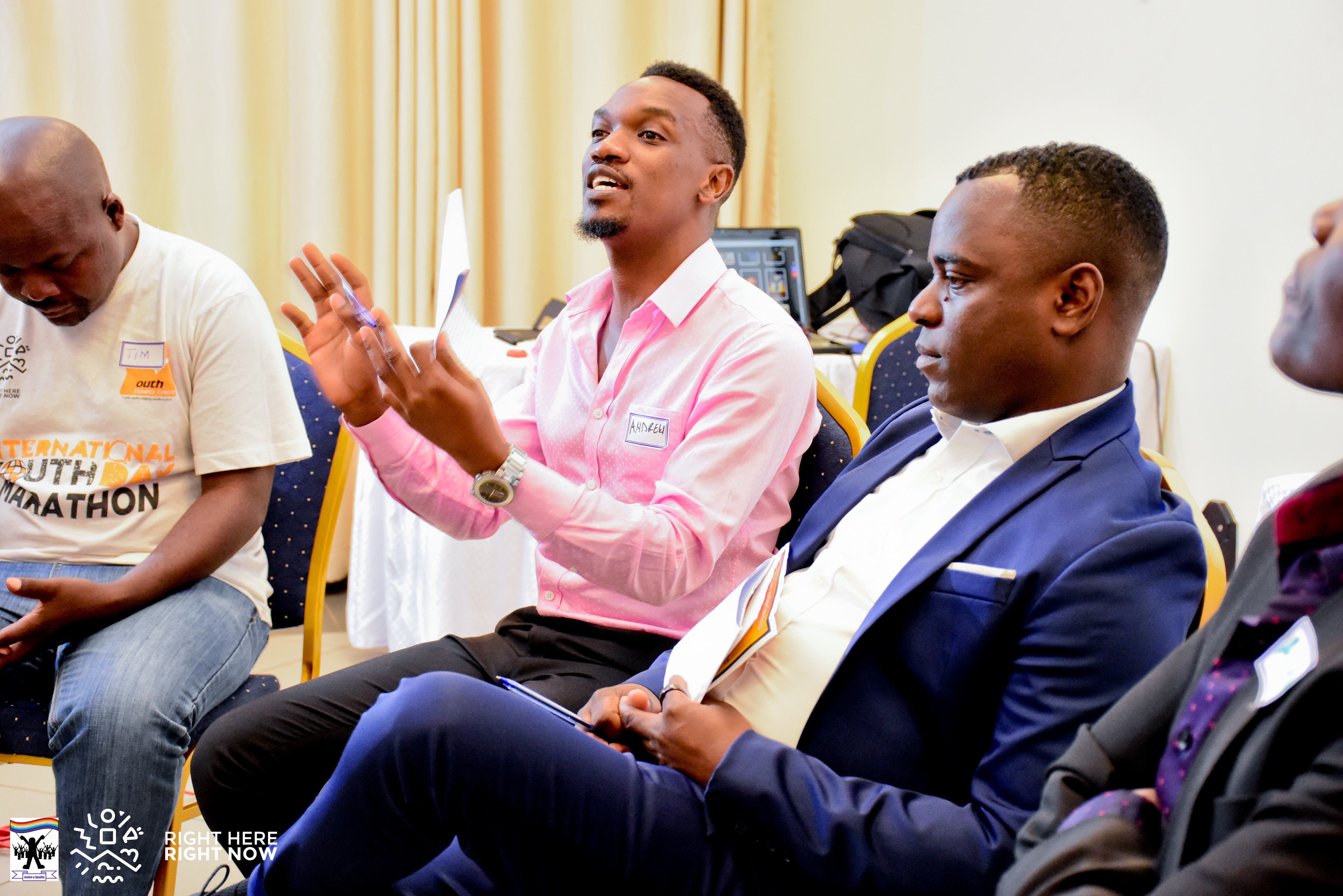
A participant shared how on a visit to Luzira they were informed of men who have sex with men. He said, “I recently went to Luzira and new inmates would be booked by older inmates, could we term them as “seasonal gays”?
To this our Programs Director Pepe Julian Onziema said “Gender identity if I may gender is a social construct that society decided to put in place to control people hence the binary male and female and they decided to assign people with different traditionally roles. Women should stay home, be at the bottom when having sex, women should kneel for men etc while gender identity is what you identify with when you grow up you either conform to traditionally male or female according to the role you see in your family drawing you mentally due to what you see in your family. There are gender non conforming people who at times conform to male or female roles. The society has enforced one gender conformity but gender non conforming people do not belong to any.”
“I identify as a female but at times I tend to do things that men do and I will compete with them, what am I?” Asked a participant.
“Aggression is a stereotype attributed to men, they think aggressive women cannot make good partners. Homophobia in this country is portrayed in how people express themselves especially stereotypes that effeminate men are gay or masculine men are lesbian.” Said Pepe.
“I identify as a female but at times I tend to do things that men do and I will compete with them, what am I?” Asked a participant.
“Aggression is a stereotype attributed to men, they think aggressive women cannot make good partners. Homophobia in this country is portrayed in how people express themselves especially stereotypes that effeminate men are gay or masculine men are lesbian.” Said Pepe.
Anne Alal Sizomu RHRN Regional adviser said; “These stereotypes affect us for example, when I was growing up I was what one would name masculine, people even wonder how I am married but because of stereotypes, people think I’m a lesbian. This is why at work even though people think I’m lesbian I neither agree nor deny because I came to work not explain my sexual orientation and preferences. It is important to note that stereotyping has exposed many of us to security situations because someone can easily be arrested on assumption of being LGBTIQ.”
Dr Frank added, stereotypes have caused homophobia and transphobia within this African community. This causes stigma and isolation of young people in school.
A participant wondered how to describe Olympic Gold Medalist Caster Semenya.
Arthur said, When we look at intersexuality, we look at hormonal imbalance and chromosomal issues. According to science, hormones and chromosomes determine ones gender. Intersexuality is not based on genital visibility of someone. There are those who don’t even have any genitals and are using tubes to enable excretion. With Semenya’s case, she is a lady. Just because she’s married to a woman doesn’t mean she’s a man. Just because she has a deep voice or presents what we call masculine characteristics doesn’t mean she’s a man otherwise she wouldn’t be fighting to be included in the women’s competition.
While addressing transitioning, Pepe said “There is no law in Uganda that criminalizes transgender people or medically transitioning. I looked at the births and deaths law and there was heavy debate in parliament when legislators wondered if transgender people should be included in the law. When it comes to surgeries there is a section where people above 18 years can have surgery. Unfortunately before one can medically transition in Uganda, they have to go through of transphobia and stereotypes at the hands of these specialists.”
He added; Social transition is when a transgender person starts expressing themselves, away from the gender they were assigned from birth. That is when one begins to even change their names from what is known at home, church, etc. In a social / entertainment center or safe space one can go by Mark but when they go back home they are Maria. Medical transition is when one makes the decision to go and meet with a doctor who determines what they really have to do. They see a psychologist who has to help with their body and mental state to make sure they are legible to go for the physical surgery. One has to cut down on all substances they have been using because during surgery, they go under anesthesia for over 10 hours hence need to change life style.
While speaking about the Sexual Rights and Health Rights of LGBTIQ people, Brant said, “Before I became the Icebreakers Uganda-IBU Executive Director, I was the Clinic Manager. I heard about so many stereotypes including the myth that LGBTIQ especially MSM are HIV carriers. This is not true, unfortunately though MSM are at a higher risk of acquiring HIV and other STIs. At the clinic we did a pre-assessment and discovered that there is need to involve LGBTIQ people in the fight against HIV if we are to end HIV by 2030.”
Brant added, Icebreakers Uganda is the first ever LGBTIQ clinic in Uganda, we have an SRHR component within our programming and we work on referral basis together with our partners. We are available at your disposal if you need any information about LGBTIQ people.
Dr Frank Mugisha closed the session by saying; “If you are someone who believes in the dignity and respect of all people and taking action towards achieving the human rights of LGBTIQ people you are an ally of the LGBTIQ community and we are grateful for you.”
